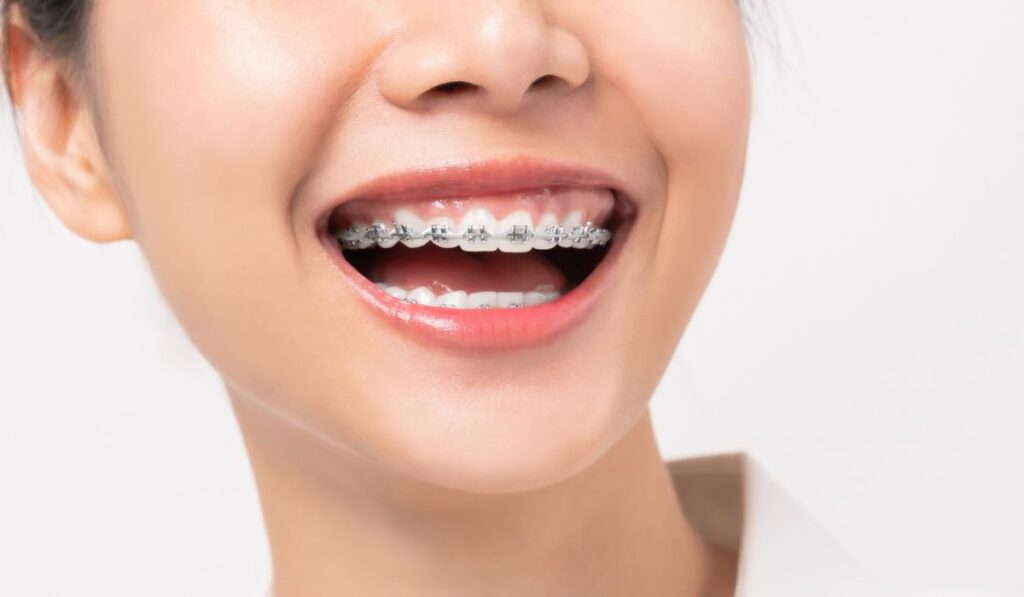Wearing braces comes with the promise of making you a happier and healthier person, with a more attractive smile. What’s not to like? However, making the decision to get braces, especially as an adult, is not so easy, especially due to some of the challenges that come with wearing braces. Other than the obvious discomfort of wearing braces, they also come with a risk of certain speech issues.
Braces can cause a temporary lisp and other speech problems during the first few weeks of treatment. These side effects are normal, since they reflect that your mouth is basically different now, but temporary speech problems go away naturally as you get used to the presence of braces.
Let’s have a closer look at how braces work, how they may affect your speech production, and whether you need to worry about speech issues from wearing braces.
How Do Braces Work?

Whether you decide to go for traditional fixed braces with metal wires and brackets or removable clear aligners, they work almost the same way to move your teeth.
Braces apply gentle but consistent pressure on your teeth and their periodontal membrane. That’s why the longer you wear the braces, the faster, more effective, and more visible the results.
The periodontal membrane is a fibrous connective tissue layer that holds your teeth in place in the jaw bone. When your braces apply pressure on your teeth, it transfers the pressure to the periodontal membrane, which stretches and compresses according to the purpose of your treatment.
This gives space for your teeth to move accordingly. When your teeth slowly move into place, the alveolar bone, which contains the tooth sockets, shapes itself around the teeth so they will be firmly fixed in their new positions.
This entire process of aligning and straightening teeth takes time, which is why the average duration of every orthodontic treatment similar to braces takes at least two years to complete.
Do Braces Affect Speech?
Yes, braces do affect speech, but not always in a negative way. In fact, there are many speech difficulties caused by dental malocclusions such as overbite, underbite, and open bite that can be fixed by wearing braces.
However, by wearing braces, you’re introducing a whole new strange device into your mouth. Therefore, it is natural to have temporary speech impediments such as a mild lisp until you (and your tongue) get used to the new hardware that is constantly in your mouth.
The first ten to fourteen days of wearing braces is usually the most difficult time in your orthodontic treatment in every regard. It can feel a little sore in your mouth after having your braces newly and firmly fixed into your teeth and the jawbone.
You need to get used to eating, cleaning your mouth, and speaking while wearing your braces. There are several ways that braces temporarily affect your ability to speak clearly:
Crowding the Tongue
Braces take up the space in your oral cavity and crowd the space that your tongue usually uses to make speech sounds. This is particularly prominent with “S” sounds.
Vibration of Air
The vibration of air across the wires and brackets of your braces may lead to a whistling sound, causing a lisp.
Changing the Shape of Surfaces in the Oral Cavity
Although you may not consciously notice it, there are many surfaces within your oral cavity that actively or passively help your speech production. Other than your tongue, your lips, teeth, alveolar ridge, and both your upper and lower jaw are some of the places that help you articulate speech sounds clearly.
Braces tend to change the shape or the form of some of these surfaces. Therefore, as your brain gets used to navigating your speech organs in this new environment to produce speech, you’re going to face an adjustment period where it can be difficult for you to speak normally.
Does the Lisp From Braces Go Away?

Yes, the lisp you develop after getting braces is temporary and it will go away. For many people, it only takes about two weeks to become familiar with having braces in the mouth.
You can also do some speech practices to help your speech organs grow accustomed to having your braces in place. That way, you can speak clearly and eloquently while wearing braces.


